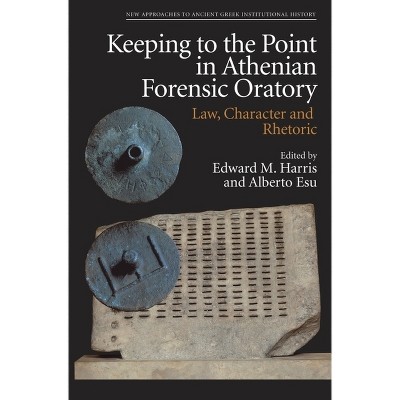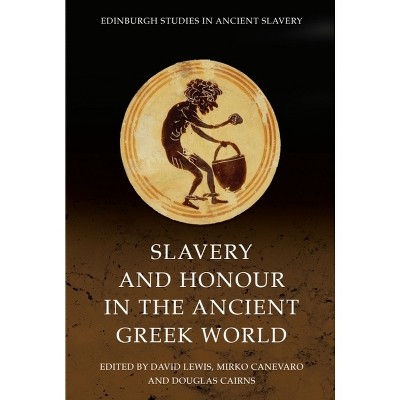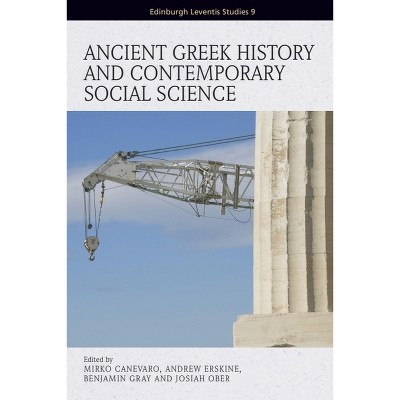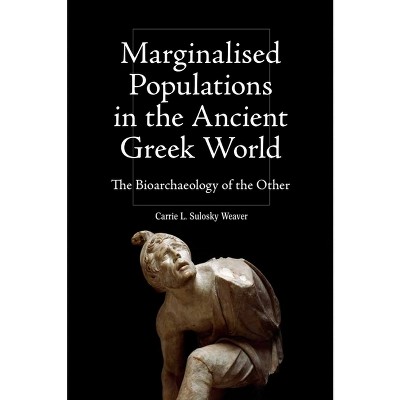The Ideology of Democratic Athens - (New Approaches to Ancient Greek Institutional History) by Matteo Barbato (Paperback)

About this item
Highlights
- Investigates the construction of democratic ideology in Classical Athens through a study of the social memory of Athens' mythical pastProposes a novel approach to Athenian democratic ideology that opens new frontiers of investigation in ancient history and the social sciencesThe introduction clearly sets out the aims and methodology of the book and its place within the scholarship in ancient history and the social sciencesFour case studies illuminate the impact of Athenian democratic institutions on ideology, myth, and the use of social memoryOffers a long-awaited new interpretation of the Athenian funeral oration for the war deadOffers clear overviews of Athenian democratic institutions (e.g., Assembly, Council, lawcourts) based on the most recent scholarshipProvides up-to-date overviews of several values in Greek thought (e.g., charis, hybris, eugeneia)The debate on Athenian democratic ideology has long been polarised around two extremes.
- About the Author: Dr Matteo Barbato is Leverhulme Early Career Fellow in Classics and Ancient History at the University of Birmingham.
- 264 Pages
- History, Ancient
- Series Name: New Approaches to Ancient Greek Institutional History
Description
About the Book
The debate on Athenian democratic ideology has long been polarised around two extremes. A Marxist tradition views ideology as a cover-up for Athens' internal divisions. Another tradition, sometimes referred to as culturalist, interprets it neutrally as the fixed set of ideas shared by the members of the Athenian community.
Book Synopsis
Investigates the construction of democratic ideology in Classical Athens through a study of the social memory of Athens' mythical past
Proposes a novel approach to Athenian democratic ideology that opens new frontiers of investigation in ancient history and the social sciencesThe introduction clearly sets out the aims and methodology of the book and its place within the scholarship in ancient history and the social sciencesFour case studies illuminate the impact of Athenian democratic institutions on ideology, myth, and the use of social memoryOffers a long-awaited new interpretation of the Athenian funeral oration for the war deadOffers clear overviews of Athenian democratic institutions (e.g., Assembly, Council, lawcourts) based on the most recent scholarshipProvides up-to-date overviews of several values in Greek thought (e.g., charis, hybris, eugeneia)
The debate on Athenian democratic ideology has long been polarised around two extremes. A Marxist tradition views ideology as a cover-up for Athens' internal divisions. Another tradition, sometimes referred to as culturalist, interprets it neutrally as the fixed set of ideas shared by the members of the Athenian community.
Matteo Barbato addresses this dichotomy by providing a unitary approach to Athenian democratic ideology. Analysing four different myths from the perspective of the New Institutionalism, he demonstrates that Athenian democratic ideology was a fluid set of ideas, values and beliefs shared by the Athenians as a result of a constant ideological practice influenced by the institutions of the democracy. He shows that this process entailed the active participation of both the mass and the elite and enabled the Athenians to produce multiple and compatible ideas about their community and its mythical past.
From the Back Cover
Investigates the construction of democratic ideology in Classical Athens through a study of the social memory of Athens' mythical past The debate on Athenian democratic ideology has long been polarised around two extremes. A Marxist tradition views ideology as a cover-up for Athens' internal divisions. Another tradition, sometimes referred to as culturalist, interprets it neutrally as the fixed set of ideas shared by the members of the Athenian community. Matteo Barbato addresses this dichotomy by providing a unitary approach to Athenian democratic ideology. Analysing four different myths from the perspective of the New Institutionalism, he demonstrates that Athenian democratic ideology was a fluid set of ideas, values and beliefs shared by the Athenians as a result of a constant ideological practice influenced by the institutions of the democracy. He shows that this process entailed the active participation of both the mass and the elite and enabled the Athenians to produce multiple and compatible ideas about their community and its mythical past. Matteo Barbato is Leverhulme Early Career Fellow at the University of Birmingham.Review Quotes
Matteo Barbato combines an analysis of political institutions with a diligent reading of funeral speeches and tragedies. He skilfully demonstrates the importance of myths in classical Athens and offers a fresh perspective on values and role models in the Athenian democracy.-- "Christian Mann, University of Mannheim"
This is a work of impressive and innovative scholarship providing a bridge between historians of ancient Greece and political scientists.[...] Highly recommended.--A. J. Papalas, emeritus, East Carolina University "CHOICE, April 2021"
About the Author
Dr Matteo Barbato is Leverhulme Early Career Fellow in Classics and Ancient History at the University of Birmingham.
Shipping details
Return details
Trending Non-Fiction











